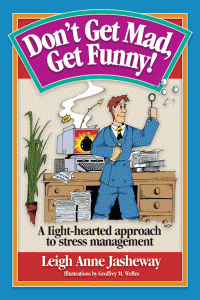Laugh laugh laugh laugh laugh…
Expressions such as, “Oh, just laugh it off” or “Don’t be such a sour puss” don’t make me smile. They make me more annoyed than I was before someone tried to lighten my load. Furthermore, I often snap back with something pithy such as, “Great! What other trite expression can you offer?” Not helpful to anyone. Leigh Anne Jasheway in Don’t Get Mad Get Funny offers a path to find healthy laughter that actually works. The following is excerpted from her book.
Finding Your Funnybone
Before you can begin to use humor as a stress management tool, you need to understand some things about your sense of humor and your ability and willingness to smile, giggle, or laugh so hard it hurts. Everyone has a different sense of humor and unless you are attuned to yours, you will end up missing many opportunities to use your humor skills to deal with life’s little unexpected miseries.
A recent study reported that the average American five-year-old child laughs out loud around four hundred times a day, while the average adult laughs out loud only fifteen. Young children are truly hedonistic – when something is no longer fun, they stop doing it. We adults call that a short attention span.
 Reaching adulthood does require a degree of buckling down and getting serious. Let’s face it – there are things we have to do whether we want to or not. But so many of us have lost the sheer capacity for fun, joy, and laughter that even when we have the opportunity, we miss it.
Reaching adulthood does require a degree of buckling down and getting serious. Let’s face it – there are things we have to do whether we want to or not. But so many of us have lost the sheer capacity for fun, joy, and laughter that even when we have the opportunity, we miss it.
Many adults face a debilitating disease that has never been medically diagnosed: humor impairment. Humor impairment is the inability to find humor even in situations that are funny to most other people. My personal term for this state is constipation, because if you can’t release your emotions through laughter, you emotional and spiritual systems are “backed up”.
Your level of humor constipation is often a result of the environment in which you grew up. If laughter was always present in your family, your ability and willingness to laugh with others is probably great. On the other hand, if, like me, you grew up in a family where laughter was frowned upon, you will probably find it more difficult to express humor in front of others.
But, as with any other behavior, you can change. I grew up in a family where expressing any type of emotion was seen as a sign of immaturity. As a result, I was a most serious child, preferring Edgar Allen Poe and Sylvia Plath to the daily comics. I married a man who believed that neither laughter nor tears were acceptable or desirable. Today, however, I make my living teaching laughter and comedy and performing as a stand-up comic. My background has truly taught me how bleak and unhealthy a life without humor can be. (By the way, I still love Edgar Allen Poe and Sylvia Plath, but now they rub shoulders on my bookshelves with books by Dave Barry and Rita Rudner.)
Take this short quiz to determine how willing and able you are to laugh at life and its foibles.
Your Laughter Profile
- During an average day, I laugh out loud, snicker or giggle:
- Once or not at all
- Two or three times
- At least once an hour
- Constantly, I’m under medication
- When I am alone and read, see, hear, or think something funny, I:
- Smile to myself
- Laugh out loud, but look around to see if anyone saw me
- Laugh out loud and find someone with whom to share the funny thing
- Take a cold shower
- In the past year, I can remember:
- At least one time I spent at least a whole minute laughing
- At least two to five times I spent at least a whole minute laughing
- More than five times I spent at least a whole minute laughing
- I can’t remember – what was the question?
- When I’m around other people, they laugh and joke:
- Never
- Sometimes
- Often
- I never hang around other people, they might laugh at me!
- When faced with daily crisis (the dog peed on the rug, I missed the project deadline again, my daughter needs brownies for school NOW!) I respond with a laugh:
- Never
- Sometimes
- Often
- Only if it’s someone else’s rug, deadline, or child
- I do things intentionally to make myself laugh:
- Never
- Sometimes
- Often
- That might hurt!
- The people I spend most of my time with:
- Leave me feeling drained and depressed
- Don’t really affect my attitude
- Make me laugh a lot
- Usually steal my lunch money
- I can name:
- One thing that almost always makes me laugh
- Two things that almost always make me laugh
- At least three things that almost always makes me laugh
- My closest relatives
- I laugh at myself:
- Never
- Sometimes
- Often
- Only when I’m not in the room
- I do silly things on purpose (wear strange buttons, make funny noises, and do things to see how others will respond):
- Never
- Sometimes
- Often
- No one ever notices
- When I hear people laughing at work, the first thing I think is:
- I wish I could get paid to goof off
- I wish I knew what the joke is
- How wonderful that they’re having a good time, I think I’ll join them
- That it’s Saturday and I shouldn’t even be here
How to score your laughter profile
Give yourself the following points for each letter: a=0 b=1 c=2 d=3. Then add them up to obtain your total score.
If your score is less than 5, you are suffering from humor malnutrition. Someone probably told you “Grow up, get serious!” and you did. In order for you to find the humor in daily events, you will have to start slowly – first by convincing yourself that humor is an acceptable emotion and one that is healthy when used regularly.
If your score is from 6 to 15, you occasionally have a good laugh, but your life lacks humor regularity. Remember, laughter is like exercise – you have to do it regularly to get the full benefit. Use it or lose it! You’re good at expressing humor when you find things funny, but your goal now is to try to find humor in those things that usually make you angry, annoyed, or irritated.
If your score is from 16 to 20, you are humorously fit! Not only do you approach life with the right amount of humor and benefit from it, you also probably make other people’s lives more enjoyable. You should become a friend and role model for people around you who need the healing power of humor yet who don’t seem to be able to use it in their lives.
If your score is from 21 to 33, you’re downright silly, aren’t you? Don’t stifle those childish instincts! Sure they told you in school that the class clown would never go anywhere in life. But they were wrong! Look at Chris Rock! He’s taking it to the bank.
Click here for a printable version.
Your Humor Compass: Where do you find the funny in life?
Now that you have a better idea of your ability and willingness to use humor on a daily basis, it is important to understand the kinds of things that you find funny. After all, just as our taste in food or art varies, so does our taste in what is and is not funny to us.
An important note here: You do not necessarily have to laugh out loud to find something funny. One of my best friends and I went to a movie together a few years ago. I laughed so hard I couldn’t see through the tears. She sat there quietly. Afterwards, she said the movie was one of the funniest she had seen in years.
Ask yourself the following questions to determine the types of humor that you will be able to use to most effectively manage your stress.
- Do you laugh more at the physical or slapstick humor you find in the Three Stooges, I Love Lucy, Perfect Strangers, and The Mask, or do you prefer verbal humor, or do you enjoy both?
- Do you have a strong sense of humor ethics? In other words, do you find certain specific types of jokes to be offensive rather than funny?
It is important for you to understand the types of humor that distress you rather than tickle you. They may include stereotypical jokes, put-downs, or humor about certain subjects that are too close to your heart for you to find them fanny at present. - Do you like jokes that focus on things you have in common with the comedian?
Studies indicate that many people do prefer humor that speaks to their own personal experience, which means that we often prefer comedy from people who are similar in age, race, or gender.| - Do you like topical humor, jokes that build on current events?
Late night humorists are scheduled to appear on television after the news to help people cope with the negative images painted during the evening newscast. If this type of humor is appealing to you, you can try, yourself, to find humor in your local newspaper and nightly news report. - Do you like wordplay and puns?
An interesting thing that I have discovered is that different types of humor appear to be more or less popular in different parts of the United States. When teaching humor classes, I have noted, for example, that people from the Midwest tend to enjoy the humor of puns more than people from other areas of the country. - Do you prefer humor that stands on its own, or do you like props and gimmicks?
Some people find Gallagher extremely funny (for those of you who don’t know, he’s the guy famous for smashing watermelons on stage). Others think he’s just silly. - Do you regularly find humor in things that aren’t necessarily meant to be funny?
For example, do you make jokes about commercials, billboards, medical forms, or warning labels on food packages?
Answering these questions for yourself will help you identify the types of humor to seek out, as well as the types of humor you yourself may attempt in order to reduce your stress and have more fun in life.

